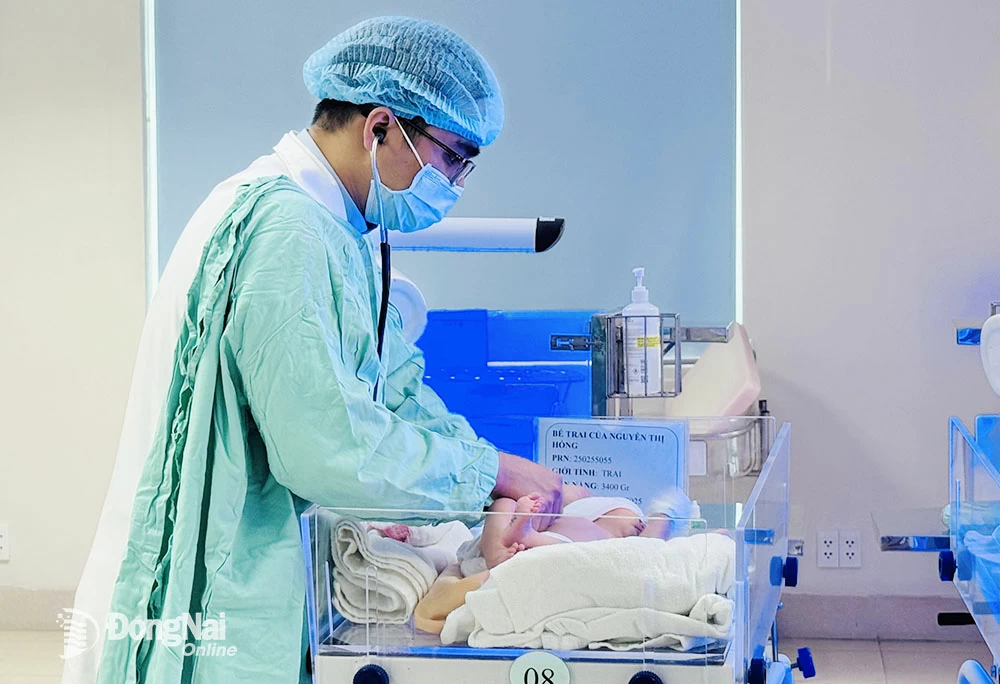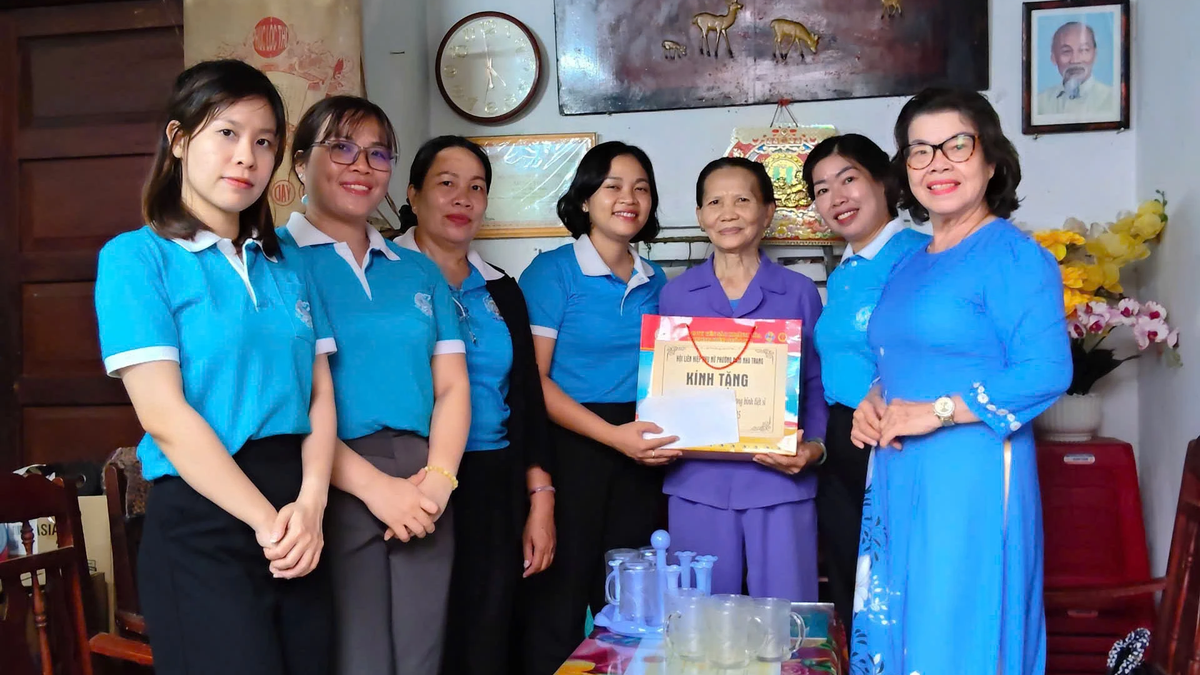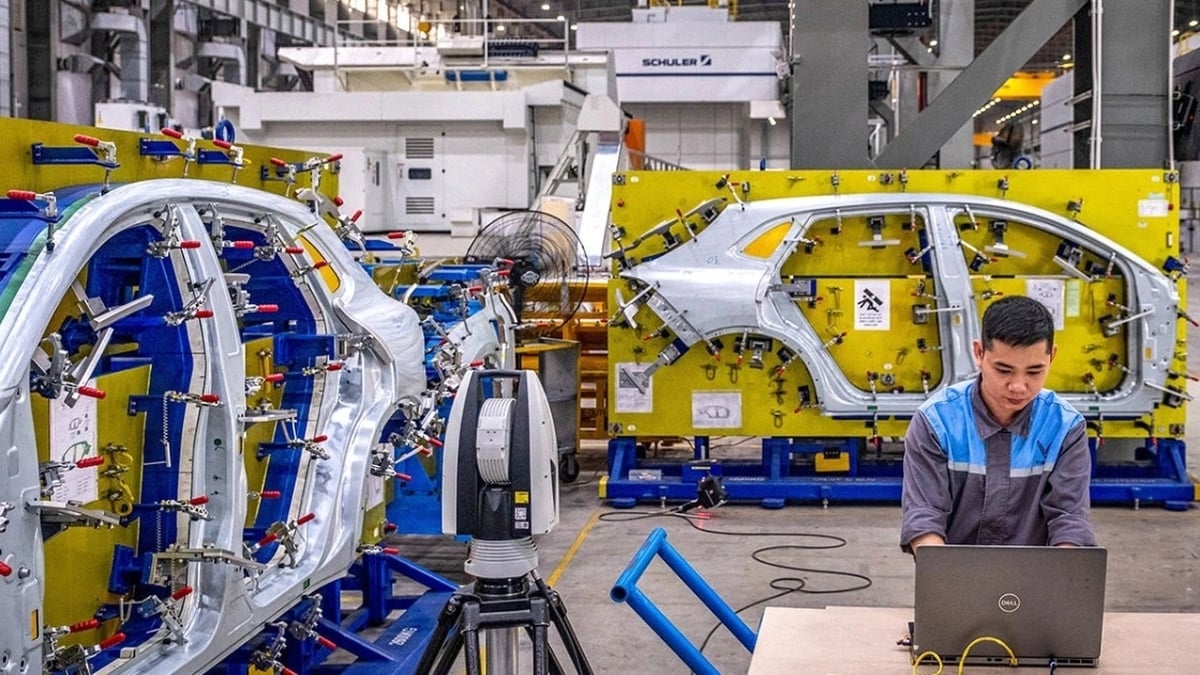 |
| Doctor examines newborn baby at Hoan My Dong Nai Hospital. Photo: H.Dung |
To help children have a complete start, prenatal screening and newborn screening are things that parents should not ignore.
Important prenatal screening milestones
Specialist Doctor I Nguyen Thi Kim Nga, Head of Obstetrics and Gynecology Department, Hoan My Dong Nai Hospital, said that prenatal screening is a test performed during pregnancy to screen for and detect chromosomal abnormalities, congenital malformations, genetic disorders or adverse effects on fetal development. Common abnormalities include: Down syndrome; Edwards syndrome; neural tube defects; recessive genetic diseases...
Depending on the stage of pregnancy, the doctor will prescribe appropriate screening methods. In particular, the double test is performed when the pregnancy is between 11 weeks and 13 weeks and 6 days, combined with ultrasound to measure the nuchal translucency and maternal blood test to assess the risk of chromosomal disorders. If the pregnant woman misses the double test, the triple test can be performed when the fetus is 16-18 weeks.
In particular, NIPT testing is highly accurate and can comprehensively screen chromosome pairs and some other genetic diseases. Previously, the cost of performing NIPT testing was quite high because samples had to be sent abroad, but now many hospitals in Vietnam can perform it at a reasonable cost.
Russian doctors said that if the results of screening tests show a high risk, the pregnant woman will be advised by the doctor to do additional specialized diagnostic tests such as chorionic villus sampling (weeks 12-14) or amniocentesis (after week 15).
Doctor NGUYEN THI KIM NGA, Head of Obstetrics and Gynecology Department, Hoan My Dong Nai Hospital, shared: “Every test today is a precious gift for the future. Many people wonder if the screening results are normal, is it necessary? The answer is very necessary, because no result is more valuable than peace of mind, early detection of just one case is enough to save a life.”
Great benefits from newborn screening
Specialist Doctor I Tran Minh Tri, Deputy Head of Pediatrics Department, Hoan My Dong Nai Hospital, recommends that parents should perform newborn screening for their children after birth. From 48 hours after birth, the doctor will take a few drops of blood from the baby's heel to perform the necessary tests. Through these tests, it is possible to detect many dangerous genetic and metabolic diseases such as congenital hypothyroidism, congenital adrenal hyperplasia, G6PD deficiency, thalassemia (congenital hemolytic anemia) ... All of these diseases, if detected early, can be treated and help children develop normally. If missed, the consequences can last a lifetime, because the disease directly affects the physical and intellectual development of children.
Dr. Tri cited an example of a child with latent thalassemia (no external symptoms), but when he grew up, if he married someone who also carried the hidden gene, the child could have severe thalassemia. This disease requires lifelong treatment and greatly affects the child's health. This is the reason why doctors always recommend that parents should screen their children extensively if possible.
At Hoan My Dong Nai Hospital, on average, about 350-400 newborns are screened each month. Test packages range from basic (3 diseases) to extensive (over 100 diseases). In suspected cases, the doctor will instruct the patient's family to perform specialized tests. Thereby, many cases of congenital hemolytic anemia and G6PD deficiency have been detected.
"The cost of newborn screening is certainly much lower than the cost of treating the disease if it is not detected early," Dr. Tri emphasized.
Meanwhile, Dr. Kim Nga said that each month the hospital receives and examines more than 1,500 pregnant women. Of these, more than 90% of pregnant women are screened before birth, nearly 100% of newborns have their heel blood taken for testing, and very few people refuse if fully counseled.
Prenatal and newborn screening not only helps detect diseases early, but is also the first step to demonstrate parents' responsibility for their children. This is also one of the effective solutions to improve population quality, reduce the burden of health and society, and contribute to building a healthy, intelligent and comprehensively developed young generation.
Hanh Dung
Source: https://baodongnai.com.vn/xa-hoi/y-te/202506/vi-sao-phai-sang-loc-truoc-sinh-sang-loc-so-sinh-1b91358/






































































































Comment (0)